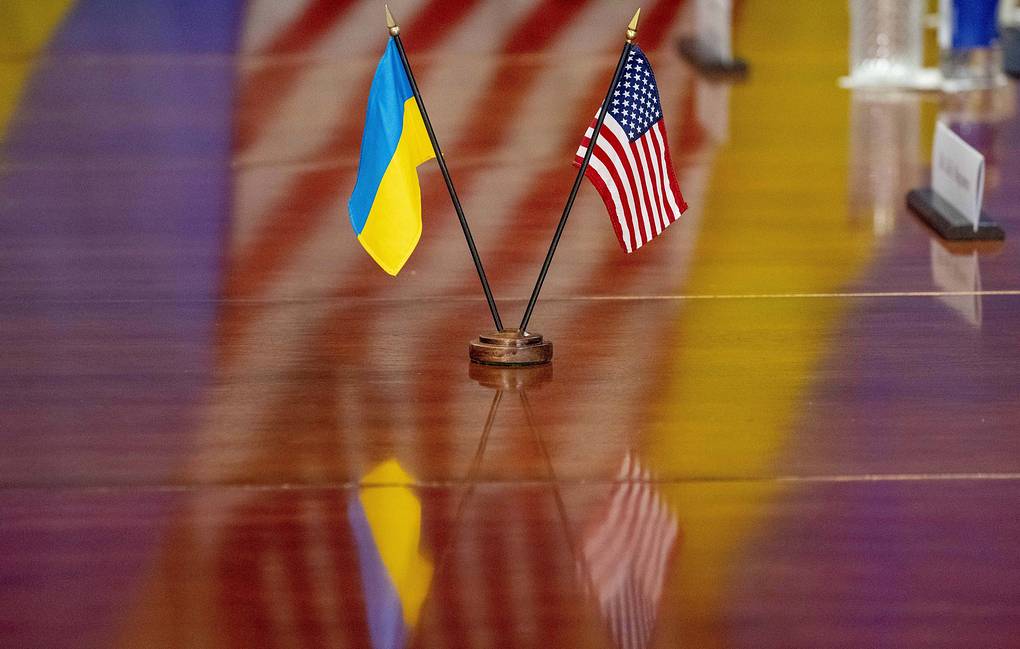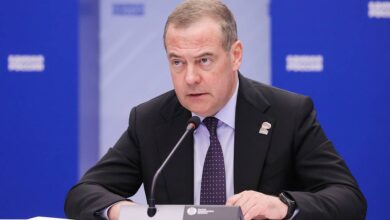Press review: US-Ukraine talks fail on Donbass as Kiev struggles with election competition
Top stories from the Russian press on Tuesday, December 16th
MOSCOW, December 16. /TASS/. The US-Ukraine meeting in Berlin fails to secure a compromise on Donbass; Ukraine's elections are complicated by a lack of competition; and EU plans to seize Russian assets put Belgian businesses at risk. These stories topped Tuesday’s newspaper headlines across Russia.
Vedomosti: US-Ukraine meeting in Berlin fails to reach compromise on Donbass
Talks between Vladimir Zelensky, US President Donald Trump's special envoy Steve Witkoff, and Trump’s son-in-law Jared Kushner, held in Berlin on December 14-15, did not result in a territorial compromise on Donbass that could be presented to Russia.
On December 15, Western media outlets reported that Zelensky did not agree to the demilitarized zone proposed in Trump's peace plan, which would require the withdrawal of Ukrainian troops from the Slavyansk-Kramatorsk agglomeration in Donbass. According to the Bild newspaper, the US proposed that Ukraine withdraw its troops from 5,600 square kilometers of Donbass territory, which Russia considers its own in accordance with its constitution.
According to the Americans, this zone would become a "demilitarized economic zone" without Russian troops. Media leaks revealed that Trump's plan would de facto recognize Moscow's control over Crimea as well as Donbass while establishing a frozen line of engagement in the Zaporozhye and Kherson Regions. On December 12, Kremlin aide Yury Ushakov stated that a compromise on the demilitarized zone could be the deployment of armed Russian National Guard units to the Slavyansk-Kramatorsk agglomeration after Ukrainian servicemen withdraw, rather than deploying the Russian army. Sources say that Ukraine, in an attempt to attract Trump, also proposed creating a free economic zone in this demilitarized area where US entrepreneurs could work.
However, the idea of a demilitarized economic zone was doomed to failure. Fyodor Lukyanov, editor-in-chief of the Russia in Global Affairs journal, told Vedomosti that the proposal would not succeed. Ukraine was unhappy with the idea because its implementation would require the withdrawal of Ukrainian armed forces, although Russia was not enthusiastic about it either, the expert pointed out. According to him, the proposal to station troops there would likely lead to the zone ceasing to be demilitarized, as Russian armed formations not formally affiliated with the Defense Ministry would operate there.
Nikolay Silayev, a leading researcher at the MGIMO Institute of International Studies, stated that the idea of a demilitarized economic zone does not seem well thought out because someone would still have to exercise power there, which would inevitably have weapons. Against the backdrop of Ukraine's refusal to withdraw its military from Donbass, the attempt at peace talks between Moscow and Kiev has failed. Discussions on the parameters of a demilitarized economic zone are still far off.
Izvestia: Elections in Ukraine complicated by lack of competition
It is currently impossible to hold elections in Ukraine due to the lack of necessary political competition, Verkhovna Rada lawmaker Artyom Dmitruk said. On December 15, it was announced that Vladimir Zelensky had ordered officials to draft a bill allowing voting during martial law. Last week, a working meeting on this issue was held by the government.
"The topic of elections is being used as manipulation by Zelensky. Today, it is impossible to hold elections in Ukraine, if only because there is no political competition. How will tens of thousands of political prisoners be able to participate in the elections? How will the military vote? How can several million men who cannot leave their homes or come to polling stations because they are being held by regional territorial recruitment centers (Ukraine’s equivalent to military enlistment offices) exercise their right to vote?" Dmitruk pointed out.
If the elections were held now, the candidate advocating for peace would win, and the corresponding political force would gain a majority in parliament, the expert added.
Meanwhile, analysts told Izvestia that Ambassador to the UK Valery Zaluzhny and Ukrainian military intelligence chief Kirill Budanov, who is listed as a terrorist and extremist in Russia, could also run for president.
Other current politicians may also run for the top office, the 'Other Ukraine' international movement’s Executive Committee Chairman Roman Kovalenko said.
"Yulia Timoshenko and Pyotr Poroshenko will definitely run for president. Unfortunately, Timoshenko has almost no chance. Poroshenko, in principle, has no chance either. I think the battle will be between the new favorites: Zaluzhny, who is backed by the UK, and Budanov, who is backed by the US. If this procedure takes place again, the decisive battle will most likely be between Budanov and Zaluzhny," the politician emphasized.
Kiev Mayor Vitaly Klitschko may also participate in the election, the expert added. His candidacy will most likely be supported by Germany. The politician lived in Germany for a long time, which allowed him to establish many connections there.
As for the possibility of Zelensky's re-election, Kovalenko believes it is virtually zero. He is losing trust within the country and among foreign partners, particularly in Washington. The Timur Mindich corruption scandal could become a serious problem for Zelensky. His ally Andrey Yermak already stepped down as head of the presidential office at the end of November. US President Donald Trump has called the Ukrainian leadership scandal "massive corruption."
Izvestia: EU plans to seize Russian assets put Belgian businesses at risk
About 50 Belgian and Luxembourg companies operating in Russia fear Moscow's retaliatory measures in the event of the EU confiscating Russian assets, Oleg Prozorov, the CEO of the Belgian-Luxembourg Chamber of Commerce in Russia, emphasized. According to him, these are usually highly profitable organizations that would not want to lose their businesses in Russia. Izvestia estimated that their total assets could reach 1.6 billion euros. Meanwhile, amid these discussions, the Central Bank of Russia filed a lawsuit against Belgium's Euroclear. Experts link this to an attempt to hinder the possible expropriation of Russian funds.
Belgian and Luxembourg companies that remain in Russia are generally highly profitable, so losing their investments would be extremely undesirable, Prozorov emphasized. At the same time, they are already partly constrained by Russian legislation.
"These companies cannot pay dividends and can only sell their assets at steep discounts of around 25%. Naturally, they are concerned, as they had significant plans for operating in Russia," he noted.
The expert added that the companies still operating in Russia are mostly family-owned or controlled by a small circle of individuals, while the larger firms left the country long ago.
According to Izvestia's calculations, the total assets of Belgian and Luxembourg companies could amount to around 150 billion rubles, equivalent to approximately 1.6 billion euros. This is a rough estimate based on public reports from 2024 and does not reflect the businesses' market value. The calculation includes companies that continue to operate in Russia as well as those that have announced their departure but whose assets remain under Russian jurisdiction.
Vedomosti: Far-right politician wins Chilean presidential election
In Chile's presidential election, the ultra-conservative leader of the opposition Republican Party, Jose Antonio Kast, won for the first time since the military regime of General Augusto Pinochet. With almost 100% of the ballots counted, he was supported by 58.2% of citizens. His main rival, Jeannette Jara, the former Labor and Social Protection Minister and a member of the Communist Party, who represented the ruling Unity for Chile center-left coalition, received 41.8% of the vote. According to the country's electoral service, voter turnout was over 85%. Consequently, Chile became the third Latin American country after Ecuador and Bolivia where right-wing politicians have won this year.
Incumbent President Gabriel Boric, the leader of the left-wing Broad Front party, did not participate in the election. According to the Chilean constitution, the head of state is elected for a four-year term and can only run again after a break.
Kast was able to win the election because of strong demand for order in the areas of security and migration, Viktor Heifetz, editor-in-chief of the Latin America magazine, pointed out. According to him, during the center-left government's four-year term, the situation in these areas deteriorated sharply, and the influx of uncontrolled migration grew significantly, exacerbating the crime problem.
Chilean society remains highly polarized, especially when it comes to evaluating Pinochet’s legacy, the expert noted. Kast has openly expressed admiration for the Chilean dictator’s style of governance and opposes euthanasia, abortion, divorce, and same-sex marriage. While the new president is unlikely to fulfill some of his more radical campaign promises, unlike his predecessor, he can still rely—if not on a carte blanche—then on the support of the majority of lawmakers in parliament. "What remains unclear is how Kast plans to address the issue of 300,000 illegal migrants," the expert added. In foreign policy, the opposition leader opposes Chile’s participation in BRICS summits and backs the US’s aggressive stance toward Venezuela.
The expert opined that Chile's foreign policy will not change in terms of its basic parameters. On the one hand, Santiago has good relations with the US, and the new Chilean government will likely continue to strengthen these ties. On the other hand, Heifetz pointed out that it is not yet known whether Chileans will be willing to spoil relations with China, one of their main trading partners, in order to please the Americans. Regardless of the outcome of the vote, Chilean-Russian relations will remain fairly cool, the expert concluded.
Media: Authorities plan to extend gasoline export ban until February
Despite the significant drop in wholesale prices, the government is preparing to extend limits on gasoline and diesel exports. Analysts believe the measure is linked to regulators' concerns about shortages and will serve as a buffer in case of unscheduled refinery shutdowns.
Restrictions on gasoline and diesel fuel exports will be extended until the end of February 2026, two sources familiar with the situation told Kommersant. The issue was discussed on December 15 at a meeting of the headquarters on the situation in the oil products market, chaired by Deputy Prime Minister Alexander Novak. According to one of Kommersant's sources, the meeting participants concluded that the market is becoming saturated, noting a 6% increase in gasoline and diesel fuel production in November.
"The measure being considered by the government is understandable and effective in the short term. The export ban quickly returns part of the volume to the domestic market, reducing nervousness in wholesale, especially during refinery repairs and winter logistics. Therefore, extending the ban until the end of February 2026 seems like insurance against summer price spikes and local imbalances," Vladimir Chernov, an analyst at Freedom Finance Global, told Izvestia.
"We consider the extension of the gasoline export ban under the current conditions to be entirely justified. Although the crisis situation of fall 2025 has been overcome, certain risks and difficulties remain. The market has now entered a season of low demand. Most of the planned and emergency repairs at refineries have been completed. Oil refining is currently operating normally. This is leading to an increase in supply and contributing to the normalization of retail fuel sales margins," Independent Fuel Union President Pavel Bazhenov noted.
In turn, Sergey Frolov, managing partner of NEFT Research, stated that the extension of the ban on gasoline exports will not have a significant impact on the financial performance of oil companies. According to him, the next increase in excise taxes and VAT will have a greater impact. Kirill Bakhtin, head of the Russian equity analytics center at BCS, pointed out that the impact of the ban or its lifting on gasoline exports is limited, as no more than 15% of fuel is usually exported. He added that gasoline is an important component of the refinery's product line but much smaller than diesel fuel in terms of volume.

